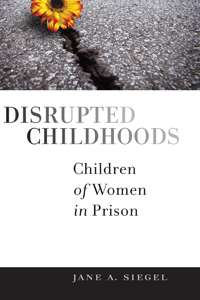Children are collateral victims when mom serves time, academic finds

John was 15 when Rutgers academic Jane Siegel encountered him for the first time. His mother was in prison – a chronic thief and drug addict, she had been arrested 31 times and convicted 15 times.
Ten years later, John's own rap sheet included eight arrests and two convictions. He'd held a series of dead-end jobs and saw little hope of anything better. He was chronically depressed.
Siegel, an associate professor and former chair of the Department of Sociology, Anthropology and Criminal Justice at Rutgers-Camden, hopes to bring people like John out of the shadows.
Through her 2011 book Disrupted Childhoods: Children of Women in Prison (Rutgers University Press), and more recently through a series of in-depth follow-up interviews with young adults, the researcher has trained a spotlight on a population whose voices are rarely heard.
An estimated 2.2 million people fill America's prisons today, among them 110,000 women – 62 percent of them mothers. "An analysis by the Pew Research Center in 2010 says there are 2.7 million children whose parents are behind bars – that's more than the number of children with autism in the country," says Siegel. "For black children, the figure is one in nine. That's very stark, very disturbing."
The criminologist recently shared her findings about how these children fare at a lunchtime presentation at the Institute for the Study of Child Development, a research center within the Department of Pediatrics at Rutgers Robert Wood Johnson Medical School.
Noting that a mother's imprisonment invariably is more likely to disrupt a child's life than a father's imprisonment, Siegel says it's not uncommon to see psychological and behavioral problems in these youngsters, as well as a litany of other ills.
Siegel has been collecting these grim statistics since 2002, when she began interviewing the children of mothers awaiting trial and mothers already serving their sentences. Over the next three years, she would profile 67 of these children, ages 8 to 18, as well as their mothers and caregivers.
"Having a mother in prison feels different than having a father incarcerated," she says. For one thing, children whose moms are incarcerated are more likely to end up in foster care than are children whose dads are in prison. The good news is that most children of incarcerated mothers live with another relative, Siegel says – but typically with a grandmother on a affixed income who is extremely stressed and unaware of the social services and financial resources available to her.
There's also more of a sense of shame and disjointedness when the female parent is the one doing time, Siegel says, as well as profound loss over having to experience important milestones – first date, prom, graduation—without her guidance and shared joy.
Watching a mother come home from prison only to have her get arrested and sent back behind bars is especially difficult for children, she notes. "Many of the kids see it as a choice their mother made: If she loved me, she wouldn't go back to prison," Siegel says. "The older children in particular had incredible anger and bitterness."
After her book came out, Siegel decided to revisit the subjects she still calls "my kids." What she found startled and dismayed her. "I went online to find out if there was any criminal data on one little boy I had interviewed, and I found out he had been arrested for murder at the age of 16," she recalls. "I was just reeling. The charges were quashed, but he was still in prison."
More research yielded similar results. Of the 12 young adults has Siegel contacted so far, many had criminal histories. More than 60 percent had been arrested either as teenagers or as adults. More than two-thirds had dropped out of high school, 60 percent reported having abused drugs or alcohol, and a whopping 75 percent had experienced mental-health problems.
Siegel is quick to point out that the news was not uniformly glum.
"What became very clear to me is that anyone who had a strong adult support figure acting as a positive role model had a better chance of doing well in life," she says, naming a grandmother here, an older cousin there. Involvement in sports or in church activities also served as a mitigating factor.
Jasmine was 14 when Siegel interviewed her the first time. An avid basketball player, she'd been recruited by a respected college, had maintained a 3.4 grade point average, landed a job and was moving up in her field. There would be no drugs for this daughter of a repeat offender, who was celebrating her recent engagement when Siegel reached her.
"Basketball was her ticket out," Siegel recounts. "Plus, she had an aunt who was very supportive while her mother was in and out of prison throughout Jasmine's childhood."
The professor hopes her research will find its way to policy makers' desks. Last summer, she spoke at a panel at the White House, convened by a high-level interagency consortium exploring the effects of parental incarceration on children.
Siegel believes that repairing the system can start with measures as simple as making prisoners' telephone calls home cheaper and visiting hours more family friendly. She'd like lawmakers to address the challenges that arise when a woman is sentenced to federal prison several states away from home, and to break through the wall of secrecy that keeps grandparents who are caregivers from reaching out for help.
"It's also very clear that more treatment is needed to that mothers can stay out of prison once and for all," she says.


















